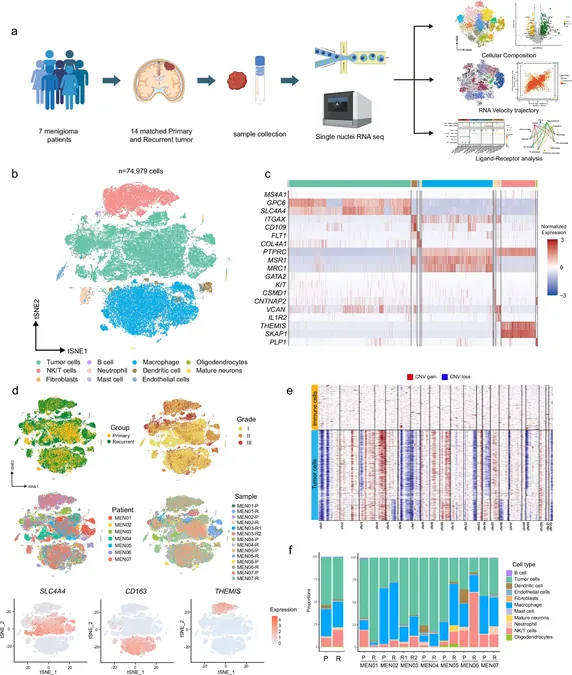
Groundbreaking Discovery: Key Gene Unlocks New Hope for Treating Recurrent Brain Tumors
2025-09-03
Author: Wei Ling
Revolutionary Findings in Brain Tumor Research
In a remarkable breakthrough, a dedicated research team has pinpointed a groundbreaking therapeutic target for recurrent meningiomas, a type of brain tumor notorious for its treatment challenges. Utilizing advanced precision genomic analysis, scientists performed single-cell RNA profiling to uncover the intricate evolutionary patterns of these tumors and their interactions with surrounding immune cells.
The Role of COL6A3: A Game-Changer in Treatment Strategies
The study, spearheaded by Professor Jason Kyungha Sa from the Department of Biomedical Informatics at Korea University College of Medicine, highlights the COL6A3 gene as a pivotal driver of recurrence risk. It presents an exciting opportunity for targeted treatment, potentially altering the grim prognosis associated with high-grade or recurrent meningiomas.
Understanding Meningiomas: The Statistics and Struggles
Meningiomas make up around 30% of all brain tumors and are typically deemed benign. But don’t be fooled—high-grade or recurrent variants can be extremely aggressive and hard to treat, leaving patients and medical professionals searching for better solutions.
Innovative Research: Bridging a Critical Gap
Previous research faced limitations in comparing primary and recurrent tumors at a granular, single-cell level. To address this issue, Professor Sa and his team executed single-nuclei RNA sequencing (snRNA-seq) on matched samples from Korean patients, revealing crucial insights into tumor progression.
The Complicated Relationship: COL6A3 and Tumor Behavior
Their findings demonstrate that recurrent meningiomas have accelerated cell proliferation and heightened COL6A3 expression. This gene shows increased activity during later stages of tumor development and even interacts with immunosuppressive macrophages, which may facilitate the tumor's malignant transformation.
A Promising Path Forward: Clinical Implications
Further investigations confirmed that elevated levels of COL6A3 are correlated with significantly higher rates of malignancy and recurrence in meningioma patients. In a separate dataset of 110 patients, those exhibiting high COL6A3 expression faced alarming recurrence rates, underscoring the gene’s potential as a therapeutic target.
A Bright Horizon for Patients
With this pivotal discovery, the medical community is closer to developing targeted therapies that could drastically improve outcomes for patients battling recurrent meningiomas. As research continues, there is hope that strategies centered around COL6A3 could lead to innovative treatments that significantly change the landscape of brain tumor care.


 Brasil (PT)
Brasil (PT)
 Canada (EN)
Canada (EN)
 Chile (ES)
Chile (ES)
 Česko (CS)
Česko (CS)
 대한민국 (KO)
대한민국 (KO)
 España (ES)
España (ES)
 France (FR)
France (FR)
 Hong Kong (EN)
Hong Kong (EN)
 Italia (IT)
Italia (IT)
 日本 (JA)
日本 (JA)
 Magyarország (HU)
Magyarország (HU)
 Norge (NO)
Norge (NO)
 Polska (PL)
Polska (PL)
 Schweiz (DE)
Schweiz (DE)
 Singapore (EN)
Singapore (EN)
 Sverige (SV)
Sverige (SV)
 Suomi (FI)
Suomi (FI)
 Türkiye (TR)
Türkiye (TR)
 الإمارات العربية المتحدة (AR)
الإمارات العربية المتحدة (AR)